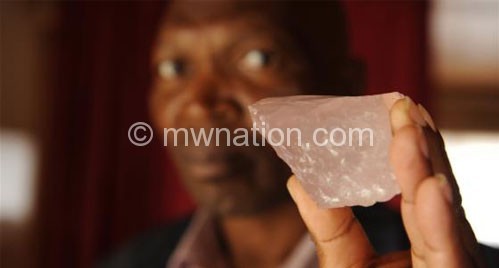MRA to collect mining royalties
- New Mines Bill shifts responsibility from Energy Ministry
Newly appointed Minister of Natural Resources, Energy and Mining Bright Msaka yesterday said the draft Mines and Minerals Bill will shift the collection of mineral royalties from his ministry to the Malawi Revenue Authority (MRA) to promote efficiency in mineral revenue collection.

Msaka said this when he opened the national consultative workshop on draft Mines and Minerals Bill at Capital Hotel in Lilongwe.
The meeting accorded mining stakeholders an opportunity to provide their final comments on the draft Bill before being presented to Cabinet and eventually to Parliament.
Over the years, Malawi has been using the Mines and Minerals Act of 1981 which mining experts say is outdated and does not respond to emerging issues in the country’s mining sector.
The country is also using the Petroleum (Exploration and Production) Act of 1983 and the Explosive Act of 1968.
Msaka emphasised the need for transparency and accountability in the administration of mineral rights and utilisation of royalties and fees for the mineral sector saying government is, firmly committed to joining the Extractive Industry Transparency Initiative (EITI) process by June this year.
Msaka, while highlighting few salient features in the draft bill, added that proposed Act also suggests the creation of a Mineral Resources Committee that will ensure transparent and efficient issuance and administration of mineral tenements.
The draft bill, according to Msaka, promotes local community engagement between the license holder and the communities in the vicinity to the tenement.
“It [the draft bill] provides for exploration companies to apply for a retention license when some economic and technical factors do not permit the development of a mine where exploration has been done,” he said.
The minister further said the draft bill, is also aligned to the African mining vision and the Malawi Growth Development Strategy (MGDS).
He said in order for the mining industry to make the expected contribution to the country’s economic growth, there is need for concerted, consistent and steadfast effort towards promotion of sustainable mining.
“This will be possible only if we develop a sound and comprehensive mining legislation, which takes into account prevailing international best practices, attract investment and enables Malawians to derive optimum benefits from mining,” he said.
Msaka said Malawi requires a piece of legislation that is comprehensive and meets international standards and attracts investment into the country.
In recent years, mining sector commentators have noted that although Malawi’s mining sector is booming, the sector is still riddled with too many flaws in the legal framework that are creating the leakage of potential tax collection.
However, according to the Malawi Revenue Authority Act, MRA is subjected to the collection of government domestic revenue in form of taxes of which no mention is made to the collection of royalties.
In response to this, Ministry of Finance spokesperson Nations Msowoya said the body has been given the task according to its expertise in the field.
He said the law will not change but for the mean time, the new MRA obligation will be gazzeted until an amendment to the MRA Act is done.
“The mining sector does not have specialised technical expertise on money collection but MRA having been in the industry for long is the body that we trust can handle the job well. It may only require gazzeting the new task to make it official while waiting for law is amended,” he said.





